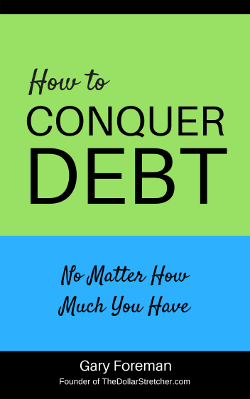Could Debt Derail Your Retirement? A Checklist
by Gary Foreman

One of the most important ingredients for a comfortable retirement is to be debt free when you retire. Could debt derail your retirement? Use this checklist to find out.
Perhaps you’re still paying on your kids’ student loans. Or maybe you accumulated some debts during the last recession. No matter what the source, you’re getting closer to retirement and wonder whether debt could derail your retirement.
It’s a good question. Financial planners will tell you that one of the most important ingredients for a comfortable retirement is to be debt free when you retire.
Checklist: Could Debt Derail Your Retirement?
We’ve designed the following checklist to help you determine if you have a problem or if you’re worrying needlessly. Review the list below and see if any of these apply to you:
- If your credit card balance is over $10,000 and rising
- If, after paying your bills, you don’t have enough for your day-to-day living expenses (i.e. food, gas, etc.)
- If you’ve been late paying rent or mortgage more than once in the past 12 months
- If you’re afraid to total up your debts because you don’t want to know how much you owe
- If you’ve been hiding some debts from your mate
- If you’re having more frequent arguments or disagreements about finances with your mate
- If the amount you owe on credit cards and personal loans is increasing each month
- If you use a cash advance on one card to make a minimum payment on another
- If the interest rate on your credit card increases to the upper teens or higher
- If you have to choose which bill you’ll pay late this month
- If your credit card balance is more than 50% of your credit limit
- If you’ve been rejected when you applied for a new credit card or personal loan
- If you’ve paid overdraft fees twice in the last 3 months
- If your credit score has dropped more than 25 points in the last 6 months
- If the total that you pay in credit card minimum payments, student and personal loans totals more than 10% of your take home pay
- If your mortgage is more than 30% of your take home pay
- If car payments are taking up more than 15% of your take home pay
- If you find that you don’t have any money left at the end of the month to add to an emergency fund or retirement account
- If worries about your finances are causing you to lose sleep
The Price You Pay for Being In Debt
Before you decide to do something about debt, you need to recognize what that debt is costing you. Along with the emotional stress, we’ve listed a few of the prices you pay for being in debt.
- Higher interest rate for credit cards and personal loans
- Some loans are not available to you
- Higher auto insurance rates
- Money spent on interest cannot be used for other things
- Higher rate for home mortgage or home equity line
- Lower credit score
- You can’t control how much you spend for past purchases each month
Is It Time to Take Action? Could Debt Ruin Your Retirement?
 If you checked some of the problem indicators or find that you’ve suffered any of the costs of being in debt you have a choice to make. You can continue to pay for your debt and hope that it doesn’t cause problems when you retire. Or you can take action to free yourself from it. It is your choice.
If you checked some of the problem indicators or find that you’ve suffered any of the costs of being in debt you have a choice to make. You can continue to pay for your debt and hope that it doesn’t cause problems when you retire. Or you can take action to free yourself from it. It is your choice.
Our ebook How to Conquer Debt No Matter How Much You Have can provide you with the tools you need to create your own personalized debt payoff plan tailored to your debt burden, budget and lifestyle. Why not get started today?
Reviewed March 2023
Sign me up for a comfortable retirement!

